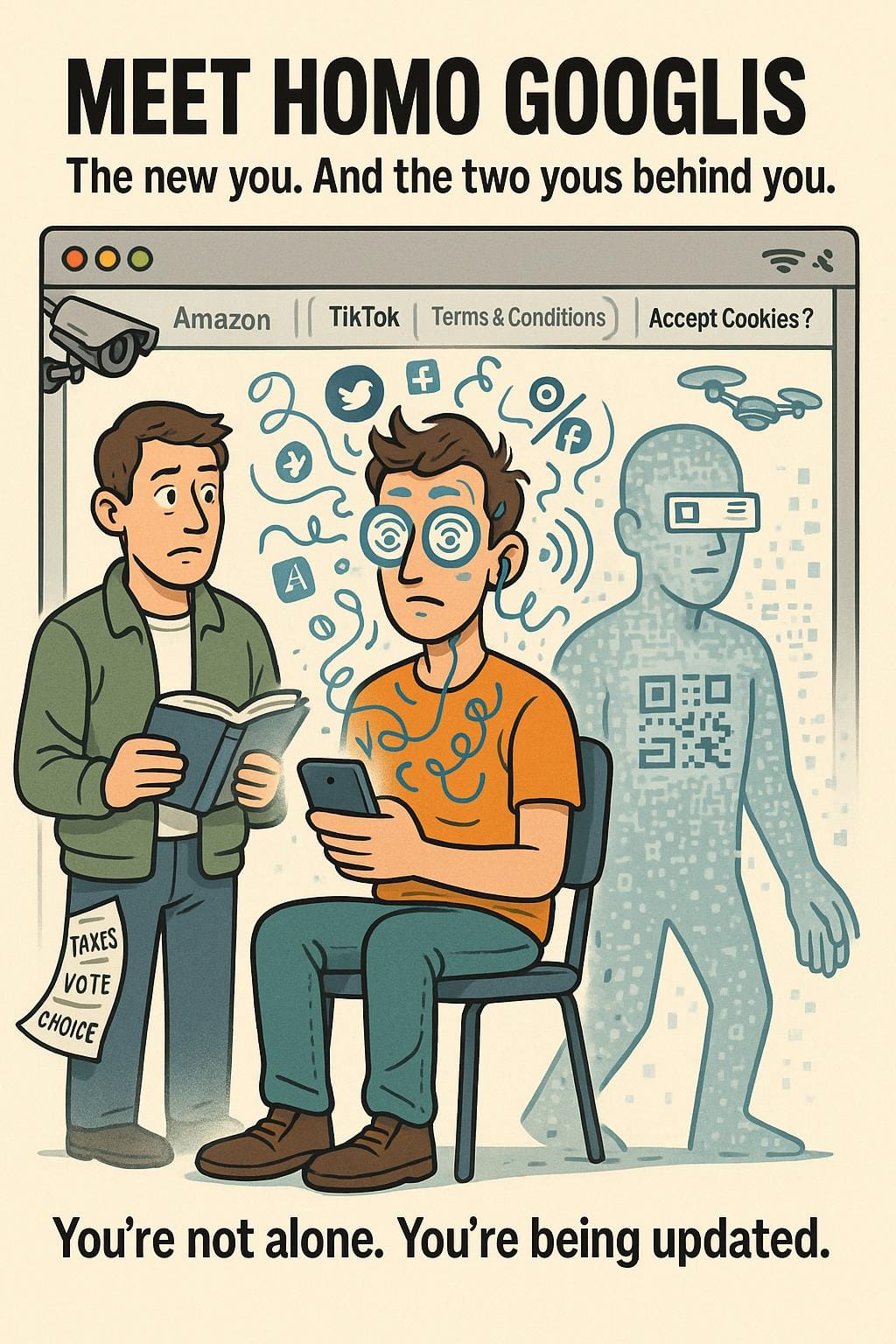
Please, sit down and read carefully, yes, all three of you.
You. And the two shadows, your twins, following you across the screen.
Whether you realize it or not, whether you like, you accept it or not, you're not alone anymore. There are three of you sitting in the same chair. Reading from the same screen. Sharing all moments of your life.
First, there's you — the physical self.
The one with a body, fingerprints, and who owes taxes, and has rights. The one who can marry, vote, change religion, choose steak or tofu, be gay, Muslim, vegan, or just undecided. You, the physical being, are still free. You still have legal protection. You still bleed.
Then there's your digital self.
A mosaic of clicks, likes, search histories, GPS trails, chat logs, purchase records, voiceprints. A ghost made of data. It’s the self you created. But you can’t control him anymore. You offered it up to the web, and now it lives on platforms you don’t own, managed by algorithms you don’t understand. It has no rights. No dignity. And one day, we’ll have to face a hard truth: we built something we can’t inherit or defend.
But the third one…
That’s the new one. The post-human one. The new mankind after Homo Sapiens.
He doesn’t look up. He scrolls. He taps. He consumes. He lives with a smartphone in hand, 24/7. And he Googles.
I call him Homo Googlis.
I named him. Yes, I coined the name in my books. I'm European, an attorney specialized in privacy, data protection, and the kind of digital law that still believes people and their identity matter. Years ago, I saw something shift. I saw a new being appear — not just a digital identity, but something deeper, more invasive. A creature born in less than 25 years, and already capable of replacing Homo Sapiens.
This isn’t just a theory.
Doctors, psychologists, educators — they’re seeing the signs too. New addictions. New fears. New disorders. A new species, with new diseases, born of a different environment.
Not evolution. Not progress.
A mutation.
Homo Googlis doesn’t think — he reacts. He doesn’t reflect — he refreshes. He’s not uninformed, but misinformed with confidence. He lives on Wikipedia, buys on Amazon, and defines reality by Instagram likes and TikTok loops. He doesn't remember facts — he remembers keywords.
And he doesn’t care.
Because caring takes time, silence, effort — things he has forgotten. While you were busy believing you were still in control, your digital twin took over. It now opens doors, signs documents, and gives you access to services and buildings.
It’s searchable, trackable, hackable. It lives in databases. It doesn’t sleep. And neither does the system that monitors it.
But Homo Googlis?
He doesn’t ask who owns his data. He just wants faster Wi-Fi.
He’s not just your online version. He’s your behavioral ghost.
He lives in loops of dopamine and distraction, fueled by convenience and curated rage.
And here’s the real danger: he has no legal rights.
No legacy. No sense of dignity. He's born to scroll, and conditioned to obey.
So yes, there are three of you.
And only one still dreams in analog.
The others?
They’re already being monetized...And if you don’t believe me —
That’s fine.
Homo Googlis wouldn’t either.
He’d just Google it.
Tags: #Digital Identity, #Online Privacy, #Homo Googlis, #Behavioral Tracking, #Tech Addiction, #Data Rights, #Digital Law, #Post Human Era, #Social Media Psychology, #Surveillance Capitalism
Gianni Dell’Aiuto is an Italian attorney with over 35 years of experience in legal risk management, data protection, and digital ethics. Based in Rome and proudly Tuscan, he advises businesses globally on regulations like the GDPR, AI Act, and NIS2. An author and frequent commentator on legal innovation, he helps companies turn compliance into a competitive edge while promoting digital responsibility. Click here for more information on his website


